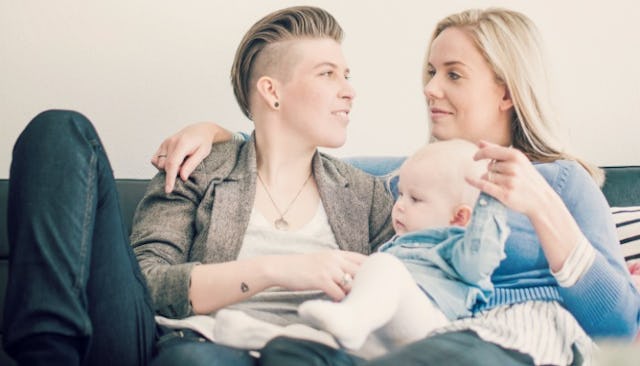Why It Sucks To Be The Favorite Parent

I’m the favorite parent; there’s no denying it. I’m the one my kid cries for in the night, the one she runs to when she gets hurt, the one she reaches for when we both walk through the door. And it sucks.
I never thought that I’d feel this way. After all, one of my reasons for wanting to have a kid was to experience that all-encompassing, unconditional love that only small children seem able to project. Two years into parenting, I’ve experienced that love many times over. I relish the full-body hugs, being invited into all of her toddler adventures, and knowing that I can solve anything. All of these moments, though, come at a cost.
Being the favorite means being on call at every moment, knowing that when my kid shouts over the monitor at 2 a.m., she’ll be shouting for me. It means spending those rare evenings out worrying about how bedtime is going and coming home to find that she’s still awake after crying for me for three hours. It means never even considering going away for the weekend. It means being touched, constantly—having my leg clutched, my arm tugged, my ears clung to, my face scratched.
Being the favorite means Saturday mornings like this one: My daughter wakes up at 6 a.m. and calls over the monitor, “Mummy! Need mummy!” But Saturday is my morning to sleep in, so my partner groggily steps out of the bed, and I nest deeper into the pile of blankets. The monitor is still on. I hear my partner walk into the room and say good morning. My kid’s calls turn into cries. “No! No! Need mummy! Mummy! Mummy!” I turn off the monitor, but I can still hear her crying. I give in and go downstairs, still tired.
The hardest part about being the favorite, though, is that it means that my partner gets hurt. When my kid calls for me, she is implicitly not calling for my partner. When my partner responds to those calls, the rejection is often more explicit: “No! Not you! Mummy!” My kid is a toddler now. She’s too young to know that she’s being insensitive or to be told to develop some tact. She doesn’t notice or care that she’s hurting somebody who loves her. This favoritism is made more complicated by the fact that we are a two-mom family. My kid’s preference for me can’t be couched in the gentle, if sexist, excuse that young children often form close bonds with their mother. When my kid chooses me, she’s choosing one mother over the other. In a family where (like many families of toddlers) we spell everything out, my partner asks “Why does she H-A-T-E me?”
It isn’t that my kid hates her other mother. She doesn’t. On some mornings, she greets my partner with an enthusiastic “hello,” arms outstretched. Neither my partner nor I are deprived of hugs, kisses or gifts of scribbled on paper. Bedtime stories read by my partner are a treasured part of the nighttime routine, and I’m not invited. When my kid says, “I love you,” it’s always genuine. But the love that our kid has for both of her parents doesn’t change the fact that I’m the favorite.
We do what we can to combat our kid’s favoritism. Whoever is closer picks her up when she falls. Even though it makes bedtime an ordeal, I still go out at night. When she cries as I leave the room, I keep walking. We do what we can to reassure each other. My partner, holding our screaming kid, tells me, “It’s OK! We’ll be fine! You go out!” I do go out, and it is OK, and they are fine.
When my partner spells out again, “Why does she H-A-T-E me?” I remind her that she isn’t hated. She’s loved with the full expanse of our toddler’s heart, even when that same toddler is calling out my name. I remind both of us it’s OK that I’m the favorite right now, that I’m called for, clung to and constantly needed. There will be a day when I’m not the favorite—a day when my partner will be the one our kid turns to as the keeper of secrets, the homework helper, or the mender of a broken heart. There will be a day when my toddler is a teenager and turns to me and screams with all of the rage she can muster, “I hate you!” On that day, we will tell her the same thing that we tell her now: “You don’t need to choose either of us, because you are safe with both of us. Both of us love you more than anything.”
There is only one favorite in our family: It’s her.